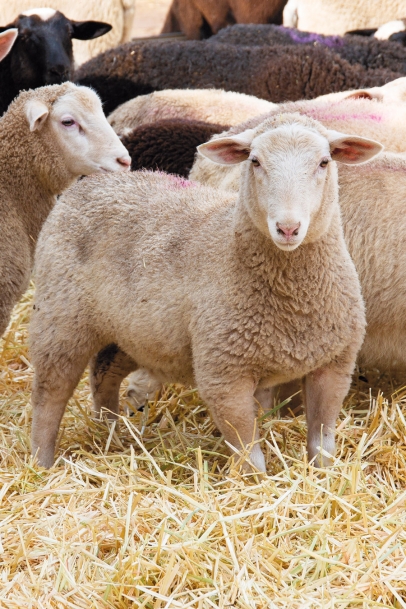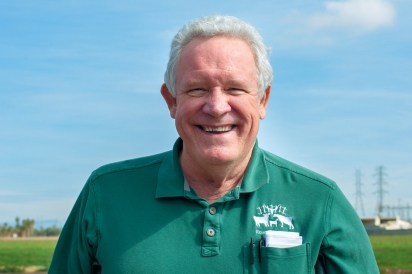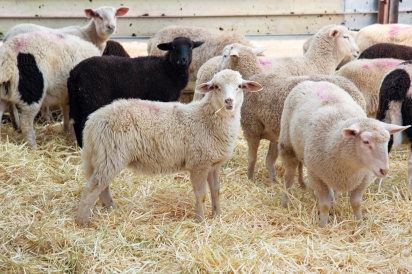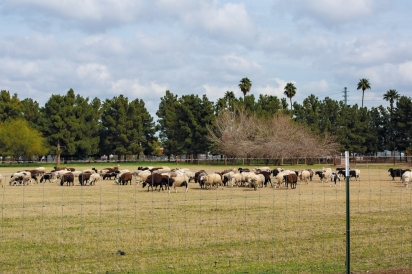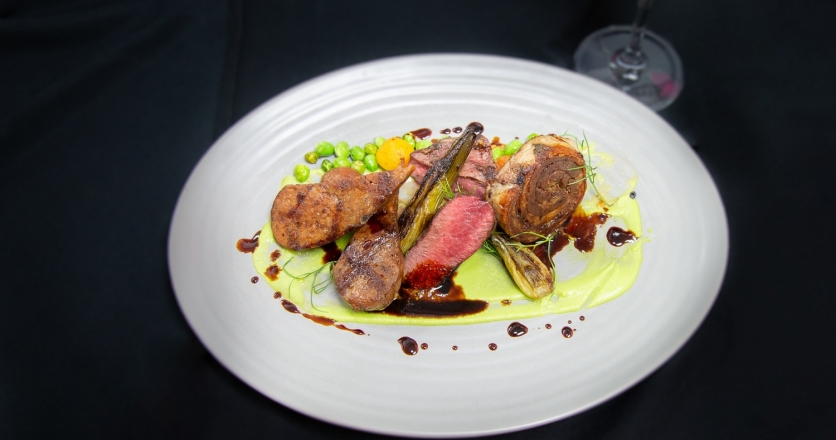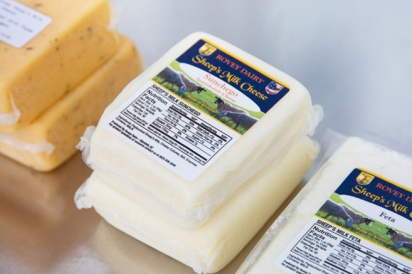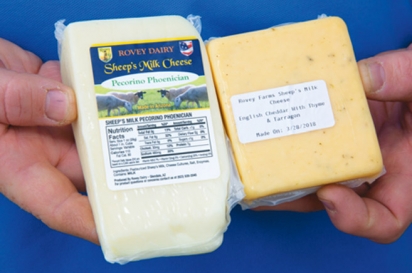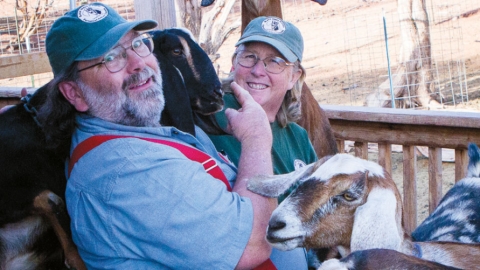From Ewe to You
Arizona boasts award- winning goat cheeses and excellent lamb but finding locally produced sheep-milk cheese has been a challenge. Until now.
Glendale’s Rovey Dairy is raising sheep for meat and milk and currently offers a variety of new sheep-milk- based cheeses.
Paul Rovey and his children are the third and fourth generations to carry on the traditional family dairy business started by Albert Rovey in 1916. Paul’s father, Emil, bought the current farm in Glendale, where Paul was born. The family’s love for farming led them to expand their cow-based milk operation, even as the city mushroomed around them.
With business acumen and creative entrepreneurship, they have introduced new feed crops, expanded the dairy facilities, integrated sophisticated analytical technology and nutrition monitoring and improved their livestock breeds. Now they are developing a niche sheep-cheese and lamb-meat operation.
Paul Rovey got into the sheep business almost by accident. “It did not come about as a deliberate plan— rather I stumbled into it,” says Rovey. “About seven years ago I had some available pasture and a neighbor offered me his flock of Dorper sheep.” Rovey loves lamb meat and was happy to have a long-term supply in his backyard so the deal was done.
One day, a visiting dairy economist saw the sheep and asked Paul, “Why aren’t you milking those sheep?” Dorpers are a dual-purpose breed from South Africa, good for both milk and meat. They give more milk than most other breeds, and Rovey learned that the high fat and protein composition of the sheep milk was good for cheesemaking. He gave it a try and found it rewarding.
Since then Rovey has introduced East Friesians to the flock, a high-yield dairy breed that he is crossing with the Dorper, and with Awassi sheep, an ancient desert-adapted milking breed from the Middle East. Through cross-breeding he is developing a high-producing milk flock that is well adapted to the local environment. The current flock is 1,500 strong and will increase to 2,000 next year. A dairy sheep is milked for about six months out of the year, and the Awassi breed will produce about 500 kilograms (1,100 pounds) of milk over that period.
The Rovey farm produces 80% of the feed crops for their animals, ensuring the best quality grasses and grains and the highest nutritional value. Paul’s son Brett manages all the crop production. Along with alfalfa, barley, teff and oats, they grow corn and sorghum for silage. A dairy nutritionist monitors the animals’ condition each week and adjusts the feed mix according to their needs and the season.
A practical innovator, Rovey has been replacing corn with sugar beets for feed. “Compared to corn, the beets have a higher yield per acre, use less water and fertilizer, are more easily digested and more nutritionally efficient.”
Rovey says that sheep milk has twice the fat content of Holstein milk, and is also higher in protein: 6%–7% versus 3% in Holstein milk.
Most grocery store milk comes from Holstein cows. Rovey’s cows are mostly Jerseys, which produce a high-fat- content milk good for making cheese. Rovey sells all his Jersey cow milk to United Dairymen of Arizona Co-op, where it goes into products of multiple labels.
By special arrangement, the Co-op also custom-processes the sheep milk for the Rovey private label cheese. The sheep milk is frozen upon delivery and thawed slowly when, over the course of a week, there is room in the schedule to process it. The sheep milk molecule is half the size of a cow milk molecule, and so it does not break down or “crack” when it is frozen. Because of this characteristic it is also more digestible for humans than cow milk.
With the help of Matt Rainier, food scientist and professional cheesemaker, Rovey produces Cheddar- and Gouda- style cheeses along with blue cheese crumbles, feta and a hard cheese they call “Pecorino Phoenician”—a favorite of Chef Jeremy Pacheco at Lon’s at the Hermosa Restaurant.
Chef Pacheco’s discovery of the Rovey products is the result of another serendipitous encounter. About a year ago, a Chicago radio program host who reports on meat and commodities news was in Phoenix on business and dined at Lon’s. Enjoying the dinner, he asked Chef Pacheco if he would be interested in some local lamb meat and cheese. Pacheco was all in, and the introduction to Rovey was made. He now buys their lamb and a selection of cheeses regularly, along with Rovey’s Wagyu beef (another niche expansion of the business).
Pacheco uses Rovey cheeses in a variety of dishes: blue cheese for a Baby Gem lettuce wedge salad, feta for tomato salads and Gouda-style for cheeseburgers made using Rovey Wagyu beef. His favorite cheese, the Romano style “Pecorino Phoenician,” is an ingredient in many dishes, including a gnocchi dish made with pancetta, asparagus and the cheese.
“The lamb is great, too—tender every time, and not gamey,” says Pacheco. “I love getting good local meat, and especially because I know the animals are well cared for and happy. The feed is healthy and the facilities are clean. It’s a full-circle operation where the water and manure are cycled back to the land to feed the crops that feed the animals.”
“I use the whole animal, so I create a variety of dishes with the lamb. I make sausage from shanks and shoulder meat, and I make a belly confit, both of which are served together with loin medallions as a dinner entrée trio. I also make a lamb version of the Italian rolled-and-stuffed pork dish porchetta, stuffing the rolled lamb loin with sausage and herbs,”
“For the lunch menu I grind the leg meat for a shawarma- style lamb burger, served with pickled vegetables in a stuffed pita, which I make from local Hayden Mills flour,” says Chef Pacheco.
He works closely with Mark Rovey, who manages the livestock. He is excited to be helping the Roveys enhance their current products and develop new ones. “It is a great relationship for us both.”
Restaurants are good proving grounds for new products and introducing local producers to the public. Rovey hopes to expand this niche market and is set to upgrade his sheep milking facility to enable greater production capacity, and a wider market. He says, “We love the animals, the farming lifestyle and independence. Especially the opportunity to provide good-quality food.”
Where to Find Rovey Dairy Cheeses
Milk ’n More
2008 S. Hardy Dr.
Tempe
480-968-3992
arizonacheese.com
Rovey Dairy’s Retail Store
7755 W. Northern Ave.
(just west of the old location)
Glendale
roveyfamilyfarms.com
623-842-3500
Thursday–Saturday 8am–5pm
Lamb and beef cuts and all the cheeses will be available.
Local farmers markets
Look for the UDA Arizona Farms booth with feta, Gouda-style and sometimes Pecorino-style at:
Roadrunner Park, Saturdays 8am–1pm
Ahwatukee at 48th and Warner, Sundays 9am–1pm


